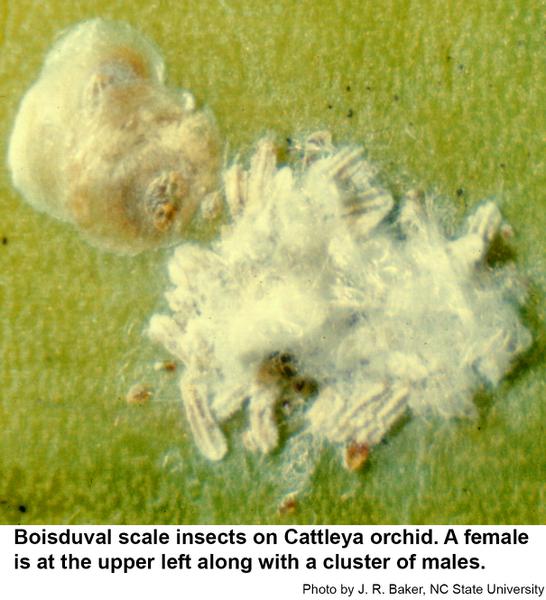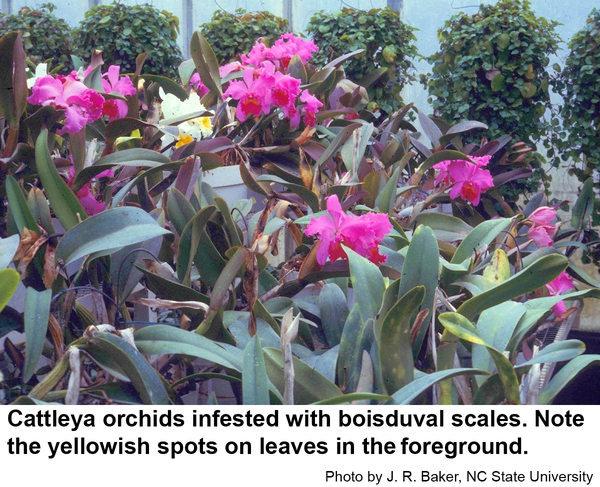Description and Biology
Boisduval scale, Diaspis boisduvalii, is the most common armored scale pest of orchids in North Carolina. The armor that covers adult female boisduval scales is circular or oval, thin, flat, white to light yellow, semitransparent, and up to 1/16 inch in diameter. The first and second stage nymph shed skins are centered or almost so on the armor. The male armor is smaller, somewhat rectangular in shape, elongate, and snow white with three ridges down the back. The early stage shed nymph skins are at the head end. Boisduval scale eggs are laid under the female armor and are oval and pale yellow to pale orange. Newly settled nymphs are pale orange. Under ideal conditions, boisduval scale can complete its life cycle in about 50 days. Females may produce up to 200 eggs in a lifetime of up to 70 days. Eggs hatch in 5 to 7 days and most of the crawlers settle to feed within 24 hours after hatching. The first stage lasts about 10 days, the second about 8 to 10 days for females and 15 for males. After mating, females retain their eggs for a short period, then oviposit. Because females produce eggs over a long period, generations overlap, and usually all stages can be found at any one time. Crawlers can settle anywhere on the leaf, but seem to prefer the midrib and major veins.
Host Plants
Boisduval scale is the most common armored scale pest of Cattleya and Cymbidium orchids in North Carolina. It also infests leaves and bark of other orchids, many palms, banana, and cacti. This scale has been recorded infesting 17 families of plants. Buds are frequently attacked prior to opening, and leaves may be killed if the infestation is dense. Lighter infestations produce irregular chlorotic spots that mark feeding sites and spoil the appearance of the leaves.
Residential Recommendations
A tiny wasp in the genus Coccidencyrtus has been reported to parasitize boisduval scale, but these wasps may not always be present. Horticultural oils (such as Ultra-Fine, Sunspray, or some other brand that is labeled for interior use) work well for armored scale insects, and they should be safe for use on palms as well as orchids. Make sure the plants are irrigated well before they are sprayed. It would be good to spray them early in the morning or late in the afternoon to help avoid phytotoxicity problems. For a few plants, 70% isopropyl alcohol on a cotton swab can wipe away these scales although orchids with soft leaves might be damaged by the alcohol.
References
- Armored Scale Identification and Management on Ornamental Plants. Frank, S. 2010. Entomology Insect Notes, NC State Extension Publications.
- Common name: boisduval scale, scientific name: Diaspis boisduvalii Signoret (Insecta: Hemiptera: Diaspididae). Espinosa, A., H. Bowman, and A. Hodges. 2010. Featured Creatures, Entomology & Nematology, FDACS/DPI, EDIS. Publication Number: EENY-467.
- Insect and related Pests of Flowers and Foliage Plants. Baker, J. R., ed. 1994. NC Cooperative Extension Service Pub. AG-136. 106 pp.
- Extension Plant Pathology Publications and Factsheets
- Horticultural Science Publications
- North Carolina Agricultural Chemicals Manual
For assistance with a specific problem, contact your local Cooperative Extension Center
This Factsheet has not been peer reviewed.
Publication date: Sept. 22, 2016
Revised: June 30, 2021
Recommendations for the use of agricultural chemicals are included in this publication as a convenience to the reader. The use of brand names and any mention or listing of commercial products or services in this publication does not imply endorsement by NC State University or N.C. A&T State University nor discrimination against similar products or services not mentioned. Individuals who use agricultural chemicals are responsible for ensuring that the intended use complies with current regulations and conforms to the product label. Be sure to obtain current information about usage regulations and examine a current product label before applying any chemical. For assistance, contact your local N.C. Cooperative Extension county center.
N.C. Cooperative Extension prohibits discrimination and harassment regardless of age, color, disability, family and marital status, gender identity, national origin, political beliefs, race, religion, sex (including pregnancy), sexual orientation and veteran status.


